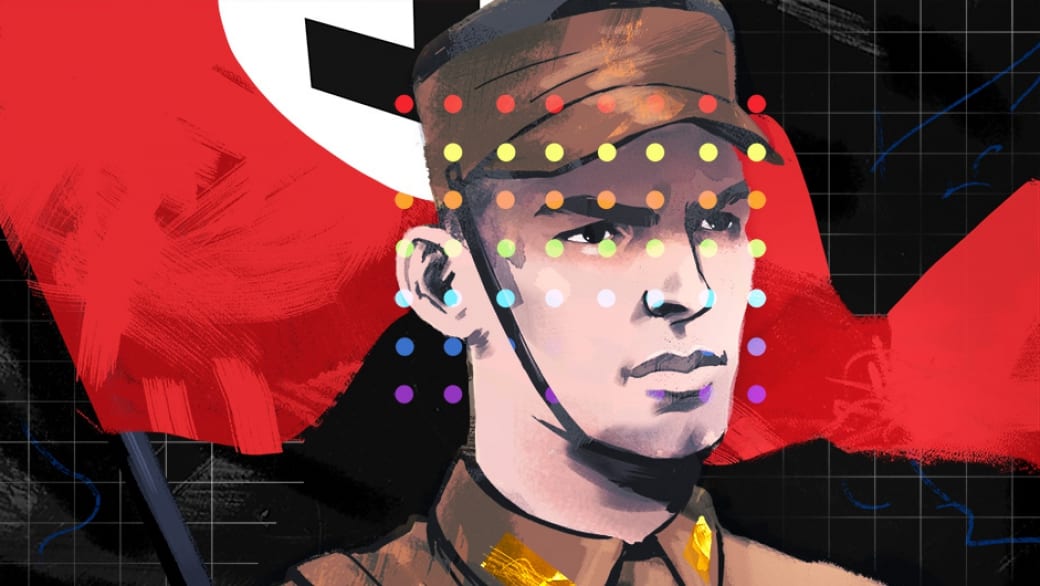There were homosexual Nazis. Some of the stormtroopers — arguably the very first Nazis — were homosexual. This may be no surprise to some — there are certainly enough depictions of sinister homosexual Nazis in fiction, and history buffs may have heard of The Night of the Long Knives — but I knew very little about it before reading Andrew Wackerfuss’ new book, Stormtrooper Families: Homosexuality and Community in the Early Nazi Movement.
The stormtroopers, or Sturmabteilung (usually abbreviated SA), were conceived as bodyguards for Nazi Party speakers at rallies. They gradually transformed into a paramilitary militia that furthered Party aims by intimidation and spilling blood in the streets (their former protection role later taken over by the Schutzstaffel, or SS). In short, the stormtroopers were thugs who helped get the Nazis into power in Germany.

Stormtroopers stuck together and formed support networks. Perhaps inevitably, this male-only organization was attractive to homosexuals (Wackerfuss argues the term “gay” is inappropriate in this context). Some stormtroopers were out of the closet, and even some of the highest-ranking SA leaders were homosexual. Wackerfuss says that the stormtroopers’ power was always associated with homosexuality, and his book explores this link through the entire history of the SA, up to and beyond The Night of the Long Knives.
The SA was an agent of chaos. It was corrupt and violent and destabilizing. This benefited the Nazi Party when it was trying to take control of the state, but once Adolf Hitler got into power in 1933 the stormtroopers’ revolutionary bent became a hindrance. Wackerfuss writes: “As long as the SA continued to rage unchecked through the streets, cafés, and public spaces of German cities, their actions would negate Hitler’s claims after July 1933 that the revolution had ended and order had been restored to the German state.”
Something had to be done. In Wackerfuss’ words, Hitler allowed himself to be convinced that the SA, whose leader was the homosexual Ernst Röhm, intended to stage a coup. It’s unlikely there was ever such a plan, but it was enough to motivate Hitler to take action. In 1934, he issued an order that the stormtroopers were to go on vacation for the entire month of June. He wanted them to let down their guard so that they would be less likely to notice what he was planning.

Röhm and some of his commanders spent the weekend of June 30 at a hotel in rural Bavaria. They spent the Saturday drinking heavily, and according to Wackerfuss, “at least two SA men paired off to enjoy each other’s company in private.” Early Sunday morning Hitler himself and an entourage of SS men arrived and arrested Röhm. They also found two other stormtroopers in bed together in another room, the high-ranking Edmund Heines and his 18-year-old driver. Heines was eventually shot, but the fate of the other is unknown.
This event kicked off a three-day massacre that became known as The Night of the Long Knives. Not only did they kill stormtrooper leaders, but anyone else who had been particularly troublesome to Hitler and other high-ranking Party officials. It’s impossible to know the exact figures, because Heinrich Himmler and Hermann Göering ordered all records of the purge burnt, but they arrested over 1,000 people and killed at least 85. Some homosexual stormtroopers ran away to avoid being murdered.
To justify the illegal massacre, the Party took advantage of the public’s homophobia and the popular belief that homosexuals tended to form conspiratorial, power-hungry cliques at high levels. Hitler said that the homosexual SA leader, Röhm, preferred to promote other homosexuals, and this had resulted in a plot to take over the state. Hitler had purged this sickness from the SA, restoring it to something like its former glory. But this turned out to be the beginning of the end for the SA.
Wackerfuss writes that this also set an important precedent. As Germany’s new leader, Hitler was going to do whatever he liked, regardless of how illegal it might be, and that would include policing people’s sexual morality and family circumstances. Wackerfuss writes: “the authoritarian family policies the Nazis later imposed on all Germany came first to the stormtroopers.” Which is ironic, given that the SA helped to create this repressive state, and to foster homophobic attitudes in German society through some of its protests.
(History Boys appears on Daily Xtra on the first and third Tuesday of every month. You can also follow them on Facebook.)
(Original illustration by Stephen McDermott)


 Why you can trust Xtra
Why you can trust Xtra


